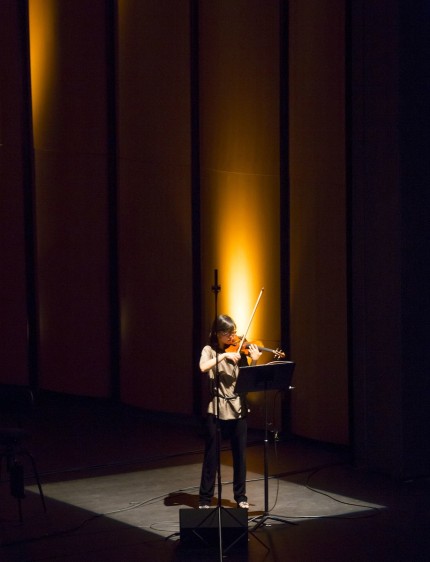Plugged-in opener gets MusicNOW season off on mixed note

Monday night brought the first MusicNOW event of the season, the fifth and final installment to be curated by the Chicago Symphony Orchestra’s composers-in-residence Mason Bates and Anna Clyne.
The all-plugged-in program at the Harris Theater offered four works by American composers, and, like many programs in the CSO’s new-music series, delivered wildly mixed results.
Anthony Cheung is a young composer who has recently been receiving much attention. A teacher at the University of Chicago, Cheung’s Lyra received its world premiere in June from Alan Gilbert and the New York Philharmonic.
Cheung’s SynchroniCities represents “a personal sonic travelogue” that reflects the composer’s interest in how disparate and seemingly chaotic sounds can find common ground. Scored for eight players, and conducted with alert precision by James Feddeck, SynchroniCities displays an acute sensitivity to shifting hues and timbres, as the music segues from slow pulsing to more agitated piano-led sections with fleeting expressive solos for cello and viola. Yet the jagged, epigrammatic fragments begin to sound directionless after ten minutes with Cheung’s work ultimately feeling like less than the sum of its plugged-in parts.
Even so, SynchoniCities at least shows a more subtle and nuanced ear for color and timbre that that on display in Mason Bates’ The Rise of Exotic Computing. Scored for a large chamber ensemble of 14 players, Bates’ “short and visceral sinfonietta” is centered on ceaseless uptempo riffing with the composer onstage once again manning his laptop/turntable. I confess I had the same mystified reaction as I have in the past to Bates’ other driving, techno-inspired works. Overscored and overamped, I found Exotic Computing empty, noisy, and something of a scam, even with vital advocacy from CSO members under Feddeck.
Michael Gordon accomplishes much more in seven minutes with a single instrument in his The Light is Calling (2004). Written in the wake of 9-11, the work is scored for amplified violin and, in its simple ascending phrases indeed reflects an intimate, hopeful expression, as sensitively played by Qing Hou. I can’t say the same for the Bill Morrison film that accompanied the performance, with the rapidly flashing distorted film images of a silent-movie scene merely distracting from Gordon’s affecting music.
John Luther Adams is the composer of the moment, having won the Pulitzer Prize earlier this year for his Become Ocean. I’ve had mixed feelings about the Alaskan composer’s music, finding previous works gimmicky or ponderous and occasionally both.
Yet Adams’ The Wind in High Places (2011) is an undeniably effective and compelling work. A tribute to a departed friend, Gordon Wright, this triptych is inspired by the wind sound of Aeolian harps. Scored for amplified string quartet, the four musicians play entirely on open strings with natural harmonics.
That lends a glowing purified sound to the slow-moving music of the first movement, which is hushed and ethereal yet never sentimental. The middle section offers contrast with a quicker folk-like flavor, while the overlapping lines of the final movement paint a touching, thoughtful solace. One could hardly imagine finer advocacy than that given Monday by violinists Baird Dodge and Sylvia Kim Kilcullen, violist Weijing Wang and cellist Joshua Zajac.
Posted in Performances

